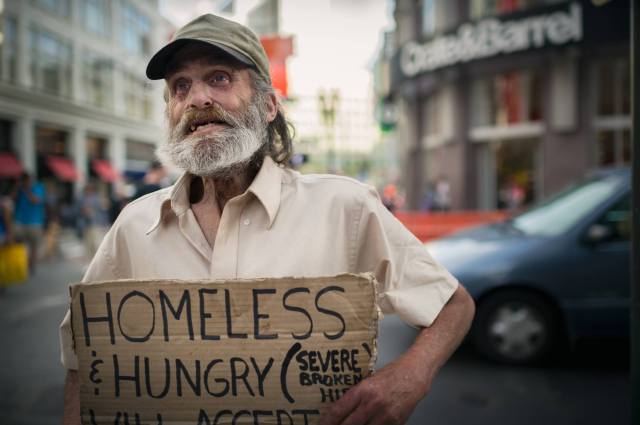Homeless in San Francisco: Getty

Of all the things you might want to symbolise your city, the human turd is pretty much bottom of the list. Yet San Francisco, the hi-tech capital of world, is indelibly marked by the association.
If you Google the words “gentrification” and “excrement” (though mind how you go), news stories about the Golden City predominate. For instance, Forbes has an informative briefing on the issue by Adam Andrzejewski, CEO of OpenTheBooks.com. We learn that “since 2011 there have been at least 118,352 reported incidences of human fecal matter on [San Francisco] city streets”. A tastefully brown-coloured bar chart of “human feces incidents” shows that this is a growing problem – the bars get longer every year.
Last year, the San Francisco mayor created a “poop patrol” to literally clean up the city. Using payroll information, Open The Books estimate that each “human waste case” costs the taxpayer $32.75, not including “sunk costs” for steam cleaning equipment, etc.
The fact that this, and the associated epidemics of homelessness, drug use and crime, is happening in one the most economically advanced and politically liberal cities in the world is an irony lost on no one.
As Karen Heller puts it in the Washington Post “everyone agrees that something has rotted in San Francisco”:
“Conservatives have long loathed it as the axis of liberal politics and political correctness, but now progressives are carping, too. They mourn it for what has been lost, a city that long welcomed everyone and has been altered by an earthquake of wealth.”
Erica Sandberg for the City Journal says that “many in law enforcement blame the crime wave on Proposition 47, which in 2014 downgraded possession of illegal narcotics for personal use and theft of anything under $950 in value from felonies to misdemeanors”. But clearly the impact of an out-of-control property market cannot be ignored. Farhad Manjoo quotes the key stats in a piece for the New York Times:
“One of every 11,600 residents is a billionaire, and the annual household income necessary to buy a median-priced home now tops $320,000.”
It’s not just the obvious consequences this has on homelessness, it’s also that runaway rental values are driving out the workers and businesses that a city needs to function as a community and flourish as a culture – especially a place like San Francisco whose character depends upon its diversity.
Karen Heller mentions the case of Lucca Ravioli – an Italian delicatessen that has closed its doors after 94 years; the land it stood on was sold off for millions to a developer.
Worse is yet to come. According to Alexis C Madrigal of The Atlantic “eight major tech companies” are expected to hold initial public offerings this year – all but one headquartered in San Francisco. That means a huge pay-out for the industry elite – who will, if the established pattern holds, pump a lot of that money into the local property market, driving prices even higher.
No wonder property turnover is so low in the city (“only 5,471 properties changed hands last year out of almost 400,000 units,” says Madrigal). Who wouldn’t hold on to an asset sat astride a river of gold?
Needless to say, San Francisco’s supposedly progressive politics is rotten with nimbyism. Farhad Manjoo points out the hypocrisy:
“Not-in-my-backyardism is a bipartisan sentiment, but because the largest American cities are populated and run by Democrats — many in states under complete Democratic control — this sort of nakedly exclusionary urban restrictionism is a particular shame of the left.”
Not that we can expect the Republicans to do much about the problem either – after all, there is a property developer in the White House. But perhaps the biggest failure is that of the tech industry. In one sense, they are the victims too – with landlords creaming off the value created by genuine entrepreneurs. One response is to join the landlord class. But those who still believe in generating wealth as opposed to extracting it should get up and leave.
Yes, there are reasons why particular industries cluster together in particular places. Proximity enables interaction and therefore creativity. But might there be a law of diminishing returns at work here? A point at which different perspectives become so bled into one another that they become indistinguishable?
Heller describes the “homogeneity” of the San Francisco knowledge class:
“Too expensive. Too tech. Too millennial. Too white. Too elite. Too bro.
“To take a midday tour downtown is to be enveloped by a jeaned and athleisured army of young workers, mostly white and Asian, and predominantly male. The presence of a boomer or toddler is akin to spotting an endangered species.”
There’s an argument that the tech industry, having changed the world is previous decades, is stagnating. Perhaps in hollowing out the things that made San Francisco special, big tech has done the same to itself.
America was built by pioneers who left over-crowded places to start afresh somewhere new. The tech ‘bros’ should get their get their shit together and do likewise.










Join the discussion
Join like minded readers that support our journalism by becoming a paid subscriber
To join the discussion in the comments, become a paid subscriber.
Join like minded readers that support our journalism, read unlimited articles and enjoy other subscriber-only benefits.
Subscribe